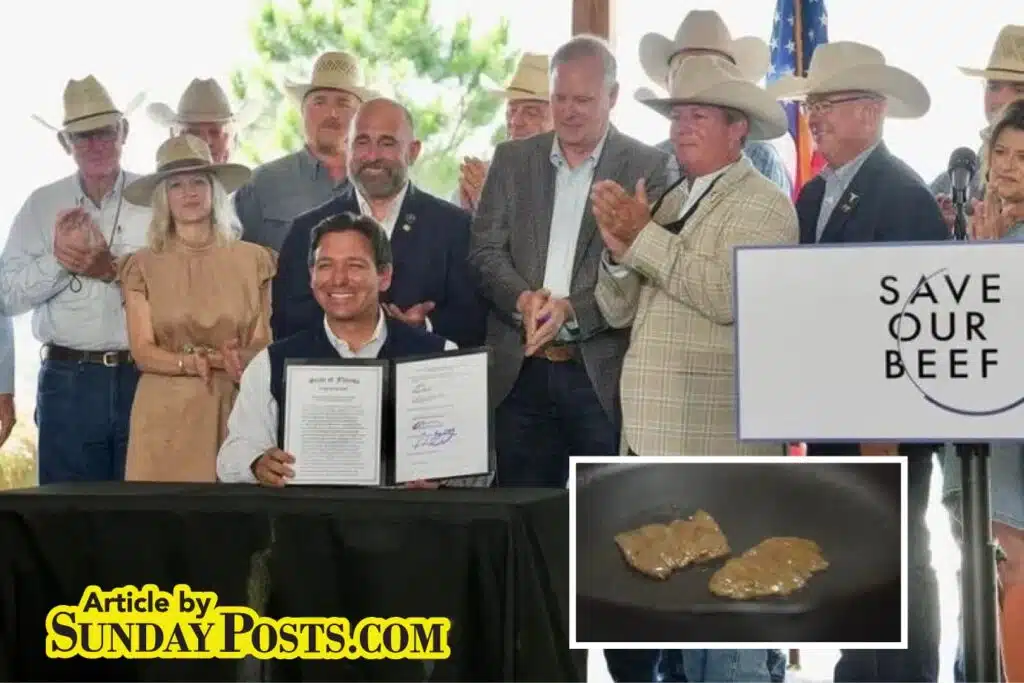The Rise of Lab-Grown Meat
In a move that has sparked debate across the nation, the state of Florida has taken a decisive step in banning the manufacture and sale of lab-grown or “cultivated” meat within its borders. Governor Ron DeSantis signed a bill into law, effectively shutting the door on this emerging technology, which many see as a potential game-changer in the world of food production.
The concept of lab-grown meat, also known as “cultured meat,” has been gaining traction in recent years as a way to address the environmental and ethical concerns associated with traditional livestock farming. The process involves taking a small sample of animal cells and cultivating them in a controlled laboratory setting, allowing for the production of meat without the need for slaughtering animals.
Proponents of this technology argue that it has the potential to reduce greenhouse gas emissions, conserve land and water resources, and provide a more humane alternative to conventional meat production. However, the new law in Florida has put a halt to these advancements, at least within the state’s boundaries.
Florida’s Stance: Protecting Agriculture or Stifling Innovation?
Governor DeSantis and his supporters argue that the law is necessary to protect Florida’s thriving cattle industry and the state’s agricultural heritage. They contend that lab-grown meat poses a threat to traditional farming practices and could undermine the livelihoods of the state’s ranchers and farmers.
“What they want to say is this is the same as raising cattle and doing it naturally, then there’s no reason that you have this industry,” DeSantis stated during the signing ceremony. “So, it is designed to represent a threat to agriculture as we know it.”
Proponents of the law argue that it is essential to safeguard Florida’s agricultural sector, which plays a crucial role in the state’s economy and cultural identity. They believe that by banning the manufacture and sale of lab-grown meat, they are preserving the integrity of the state’s farming traditions and ensuring the continued success of its cattle industry.
However, critics of the law argue that it is a shortsighted and heavy-handed approach that stifles innovation and limits consumer choice. They contend that the concerns about lab-grown meat are overblown and that the technology has already been deemed safe by federal regulators.
“Cultivated meat is safe, period,” stated a representative from the cultivated meat industry during the legislative session. “We make our chicken in a safe process in a safe environment, and USDA inspectors are on site during operations at all times from beginning to end.”
Opponents of the law also argue that it undermines free market principles and economic growth, as it effectively criminalizes the sale of cultivated meat products within the state. They believe that this move could stifle innovation and limit the potential of this emerging industry to create new jobs and economic opportunities.
The Broader Implications
The debate surrounding Florida’s ban on lab-grown meat extends beyond the state’s borders, as it raises broader questions about the role of government in regulating emerging technologies and the balance between protecting traditional industries and fostering innovation.
Some experts argue that the law sets a concerning precedent, as it could pave the way for other states to follow suit and create a patchwork of regulations that hinder the development of this technology nationwide. This could ultimately slow the progress of lab-grown meat and delay the potential benefits it could bring to the environment, animal welfare, and human health.
On the other hand, supporters of the law argue that it is necessary to protect the integrity of the food system and the livelihoods of those who have dedicated their lives to traditional farming practices. They believe that the government has a responsibility to safeguard the industries that are the backbone of their state’s economy and cultural identity.
The Future of Lab-Grown Meat in Florida and Beyond
As the debate over Florida’s lab-grown meat ban continues, it remains to be seen how this decision will impact the broader landscape of food production and innovation. While the law does not prohibit research on cultivated meat within the state’s universities, it effectively shuts the door on the commercial development and sale of these products.
The future of lab-grown meat in Florida and beyond will likely hinge on the ability of policymakers, industry leaders, and the public to find a balance between preserving traditional agricultural practices and embracing the potential of emerging technologies. It will require open and honest dialogue, as well as a willingness to consider the long-term implications of these decisions on the environment, the economy, and the well-being of both producers and consumers.
Ultimately, the outcome of this debate will have far-reaching consequences, not only for the state of Florida but for the entire nation as it grapples with the complex and evolving landscape of food production and consumption. As the debate continues, it will be crucial for all stakeholders to approach the issue with an open mind, a commitment to evidence-based decision-making, and a focus on the greater good of the communities they serve.




